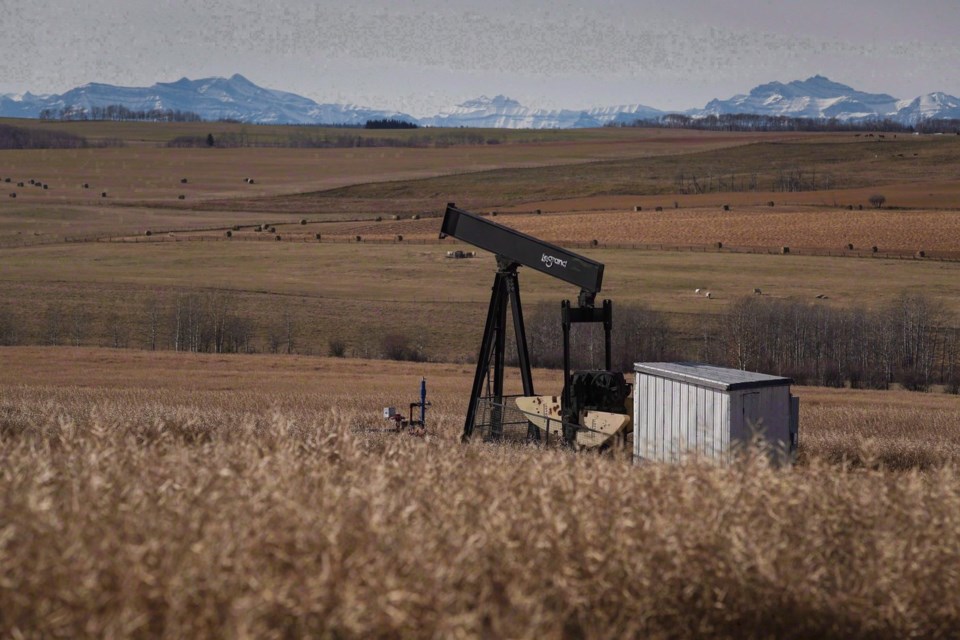A new version of a government-commissioned report about Alberta's inactive oil wells and what to do about them now says the province should manage a new insurance fund, rather than backstop it with taxpayer funding.
The tweaked language is one of a few changes made to the report, a draft version of which was leaked to media last month leading critics to warn Alberta's government was being pushed to let oil and gas companies off the hook for reclaiming wells, as is legally required.
The report, authored by David Yager, a former oilfield services executive and current Alberta Energy Regulator board member, contains over 20 recommendations for dealing with the nearly 80,000 inactive but not reclaimed oil and gas wells littered across the province.
One of those recommendations is to create a new industry funded insurance program to cover liabilities related to closed wells. The draft version said this fund was to be “ultimately backstopped by taxpayers.”
The new report now calls for that insurance program to instead be “managed” by the province.
Energy Minister Brian Jean’s office didn’t directly answer questions about why the wording was changed, instead saying in an email that a province-managed fund could be similar to the government’s emissions reduction fund, which collects industrial carbon taxes from polluters.
“The report included 21 recommendations, not set in stone decisions by the province,” Jean’s office said.
"We are reviewing all of them and will provide more information on which recommendations we intend to implement and how, in the coming months."
Another recommendation from Yager’s report is to enact legislation to create companies that would take over inactive or waning oil and gas wells and use any resource extraction profits to fund clean up efforts.
Yager wrote that "with additional regulatory and financial support" these types of companies could intercept wells before they're transferred to the Orphan Well Association, the industry-funded agency that assumes responsibility for wells when companies go bankrupt.
Jean's office said Thursday, while no decisions have been made, its envisioned that the new companies would also be industry funded.
Nagwan Al-Guneid, the Opposition NDP energy critic, said Thursday that it was "hard to trust" the report's recommendations.
She said if the government plans to move forward with the insurance fund recommendation it will need to clearly define what "managed" means.
"They need to define this very clearly so Albertans understand that they will not be left with a multi-billion dollar... mess of bankrupt oil and gas companies," she said.
Phillip Meintzer, a spokesperson for the Coalition for Responsible Energy, also said he wasn't convinced the report's changes means Alberta is ruling out the use of public funds to aid in the cleanup of inactive oil and gas wells.
"The language is maybe a little bit softer, a little bit watered down, but the province still uses public money to do stuff, so I think it still is proposing public money," Meintzer said, referring to Alberta "managing" an insurance fund.
He also questioned the viability of creating companies solely responsible for extracting unknown levels of energy from inactive wells, pointing to Yager's report noting that mature and inactive wells largely come with operating costs that "often exceed revenue."
"There's no guarantee that it's going to be profitable to operate or... that it's going to generate any revenue," Meintzer said.
Yager, who also serves as a special adviser for Premier Danielle Smith and was a one-time Wildrose party president who played a key role in merging Alberta's competing conservative parties in 2017, also recommends that Alberta shift its reclamation criteria from a zero-risk framework to a "risk-based" framework.
He wrote that doing so would mean environmental risks could be evaluated against cost of operations and "the expected benefits to ensure that they are deployed effectively and where they are needed most resulting in responsible ecological outcomes."
The Alberta Energy Regulator says there are nearly 500,000 licensed oil and gas wells across the province, although only about 50,000 are active.
As a condition of well licenses companies are required to clean up or reclaim the wells once they're drained or determined not to be profitable anymore.
A report from the Alberta Energy Regulator late last year said over $1 billion was spent reclaiming inactive wells in 2023.
It said roughly 4,000 inactive wells, or 5 per cent, of the total on record were reclaimed, despite 54 companies not meeting their yearly closure spending requirements.
This report by The Canadian Press was first published April 3, 2025.
Jack Farrell, The Canadian Press



